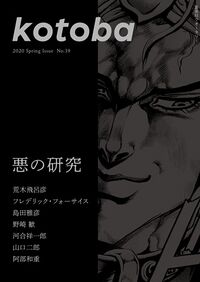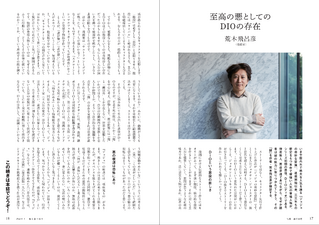Kotoba (March 2020)
ANIME Impulse (February 2020)
Interview Archive
An interview with Hirohiko Araki discussing the importance of villains and how to create them, as well as explaining the root of evil with DIO. It was published in the Spring 2020 issue of the Kotoba magazine on March 6, 2020.[1]
Interview
The Existence of DIO, The Supreme Evil
JoJo's Bizarre Adventure has become immensely popular both domestically and overseas. Since it first began its serialization 33 years ago, one of the most popular characters in the work has been DIO, the main villain in the early days of the series. Even though he is arrogant and wicked, readers are somehow captivated by his charm. Author Hirohiko Araki will now examine this mystery.
JoJo's Bizarre Adventure is a work that was created with characters first and foremost, rather than plot. In particular, I don't think the story would've been possible without the villain DIO, who confronts the family of protagonist Jonathan Joestar across generations. It's because of this extraordinary villain, DIO, that Jonathan stands out as a character. It would've been much more difficult to create the story without DIO.
The Novelty of the Villain DIO
There's a certain theory to crafting a traditional story in manga: specifically, to start by creating a strong and attractive villain. The protagonist is then assembled as a response. Whether they're a champion of justice in the public eye or a person who dilligently follows the law, the character is created to gain the reader's sympathy. It should be noted that an "antagonist" isn't necessarily a "villain." Villains can also be characters who compete with the protagonist, such as "rivals." In fact, it seems that route is more common.
Therefore, an antagonist as evil-minded and cruel as DIO might have been rare at the time. After all, he immediately committed the most cruel acts possible, like tying up the protagonist's pet dog and burning him in an incinerator.
Furthermore, manga artists also think a lot about topics such as, "If Ultraman fought Godzilla, who would come out on top?" They create stories from ideas like, "Who's the better fighter, Stallone or Schwarzenegger?"
But when you really think about "who is strong," "who is evil," or "what kinds of people make others sick" every day, you somehow end up realizing that you can't boil it down to a single field, or that it's strange to look at a character from only one angle. There comes a time when you realize that "black and white simply aren't enough." Motivations are very important for the characters of a story, answering questions such as, "Why do they act like that? Why are they taking on that task?" or, "What possible reason could they have for trying to defeat that enemy?" If you simplify a story into one of rewarding good and punishing evil, the story hits a dead end.
The villain I came to after such agonizing is DIO. As an immortal, he thinks and acts only from the perspective of himself. In his world, there is only himself and "them." It's not that he wants to conquer the world, but that he completely denies the social idea of happiness (family, lovers, friends, and so on) within his sphere of activity, and as long as he can feel his own existence, his desires must be fulfilled.
In contrast, Jonathan is burdened with values that oppose DIO's, such as family, lineage, and succession. That said, the protagonist of Part 3, Jotaro (Jonathan's great-grandson), and DIO, while representing the good and evil of the orthodox axis of conflict in manga, both have the special ability to "stop time." Because they share the same power, the Joestar family (the protagonist's family) are targets that DIO seeks to eliminate and purge. On the other hand, Jotaro fights under the circumstances of his mother facing death if he doesn't destroy DIO as soon as possible. In any case, both of them are positive about their motivations. DIO would never think, "This is too much hassle. I should cease my destructive activities" (laughs). He has a firm belief that "this is the right path." I think that is what lies at the root of the appeal of DIO's evil.
The Root of Evil is Fear
The origins of JoJo lie in vampire myths. Fear doesn't necessarily come from evil, but it plays an important role in heightening suspense. At the same time, it can also be a wonderful seasoning to make a villain stand out. When I thought about "what is most terrifying," I considered such things as a strong and violent person, or someone with an invincible weapon. I realized that being attacked by something you have no memory of, such as a curse passed down from your ancestors, is profound and especially scary.
That's where JoJo started from. The idea of being cursed without realizing it, as well a horror that threatens from across eras, were combined with the idea of a "vampire myth" to create JoJo. When the series first began in the late '80s, works dealing with serial killers and bizarre murders, such as The Silence of the Lambs (originally published in 1988), were becoming popular...
至高の悪としてのDIOの存在
いまや国内外で絶大な人気を誇る『ジョジョの奇妙な冒険』。連載開始以来、三三年もの歴史をもつ本作で根強い人気の登場人物が、シリーズ初期の悪役、DIO(ディオ)である。傍若無人、悪逆非道でありながら、なぜか読者は彼の魅力に取りつかれてしまう。その「謎」を作者・荒木飛呂彦が検証する。
ストーリーではなく、キャラクター先行で作り上げた作品が『ジョジョの奇妙な冒険』です。とくに主人公ジョナサン・ジョースターの一族と世代を超えて対峙する、DIOという悪役なくしては成り立たないストーリーだと思っています。このDIOという並外れた悪役がいたからこそ、ジョナサンというキャラクターの存在が引き立ってくる。「DIO抜きでストーリーを作れ」と言われても難しかったでしょう。
DIOという悪役の新しさ
漫画における伝統的なストーリー作りにはセオリーがあって、まず強い敵役、魅力的な敵役を作るということがあります。それに対して主人公を構築していく。世間が思うような正義の味方であれ、法に忠実な人物であれ、読者の共感が得られるようなキャラクターを造形します。「敵役」は必ずしも「悪役」とは限りません。敵役には「ライバル」と呼ばれるような、主人公と切磋琢磨していくようなキャラクターも含まれます。むしろその方が一般的と言えるでしょう。 ですから、邪悪な心をもち、残酷な行動に走るDIOほどの敵役というのは当時珍しい存在だったのかもしれません。なにしろ主人公の飼い犬を縛って焼却炉で燃やしたりと、いきなり非道の限りを尽くしたのです。
ほかにも、漫画家は「ウルトラマンとゴジラが戦ったら、どっちが強いかな?」というようなことを、ものすごく考えます。「スタローンとシュワルツェネッガーはどっちが喧嘩強いか?」といった発想で物語を作っていくんです。
ところが、「誰が強い」「誰が悪い」「どういう人がムカつく」ということを、毎日考えていると、どうも一枚看板ではやっていけないというか、「キャラクターを一つの面だけから見ていてはおかしいな」という思いに行き着きます。「白と黒だけじゃだめだな」と気づく瞬間があるんです。物語の登場人物というのは「なぜそんなふうに行動して、どうしてその仕事に就いているのか?」とか、「どういう理由でその敵を倒そうとしているのか?」みたいに、動機がとても重要になります。それを単純化した勧善懲悪で決めつけてしまうと、ストーリーは行き詰まってくる。
そのように悩み抜いて生み出した悪役がDIOなのですが、不老不死の彼は、とにかく「俺」を中心に考え、行動します。彼の世界には「俺」と「俺以外」しか存在しない。世界を征服したいわけではなく、自分の行動圏内で家族とか恋人とか仲間とか、そういう社会的な幸福観を全否定して、「俺」の存在を実感できれば欲求が満たされるんです。
それに対してジョナサンには、家族、血統、継承などDIOとは対照的な価値観を背負わせました。ただし、第三部の主人公・承太郎(ジョナサンの玄孫)とDIOには、漫画のオーソドックスな対立軸から見れば、善と悪でありながら、「時を止める」という特殊能力を双方にもたせました。同質の力をもつこともあって、ジョースター家(主人公の家系)はDIOにとっては消し去りたい、粛清したい対象となっています。一方で承太郎は一刻も早くDIOを滅ぼさないと自分の母親が死に至るという状況下で戦っている。とにかく双方が動機に対して前向きなんです。DIOは決して、「面倒くさいからもう破壊活動やめたいな」というふうには考えない(笑)。「この道が正しいんだ」という確固たる信念をもっている。DIOがもつ悪の魅力の根底にはそういうものがあったのだと思います。
悪の根源は恐怖にあり
『ジョジョ』の原点には「吸血鬼もの」があります。怖さというのは悪に由来するとは限りませんが、サスペンスを盛り上げてくれる重要な役割を担っています。それは同時に、悪役を一味違うものにするための最高の調味料になりえます。「何が一番怖いんだろう」と考えたときに、腕力が強くて乱暴な人が怖いのか、無敵の武器を持っている人が怖いのか、いろいろと突きつめていくと、身に覚えのない、先祖の呪いみたいなものが襲ってくるというのは、奥深くてとくに恐ろしいなと気づきました。 そういうところから、『ジョジョ』は始まっています。気づかないうちに呪われていて、時代を超えて迫ってくる恐怖を、「吸血鬼もの」というアイデアと一体化させてできたのが、『ジョジョ』なんです。連載を始めた八〇年代後半は、『羊たちの沈黙』(原著出版一九八八年)などのシリアルキラーや猟奇殺人を扱う作品が流行り…




